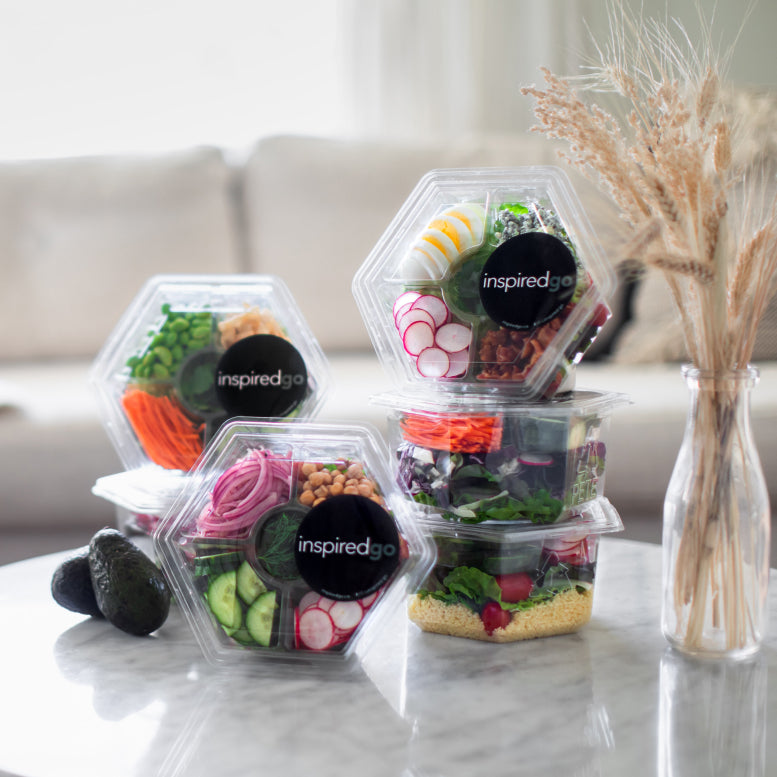What Low Calorie Meal Delivery Options Are Available For Vegetarians?
Table of Contents
1. Vegetarian-Friendly, Low-Calorie Meal Delivery Choices
2. How Many Calories Should a Meal Have on a Low-Calorie Plan?
3. How Does Low-Calorie Meal Delivery Support Weight Management?
4. How Can Inspired Go Support Your Health Goals?
1. Vegetarian-Friendly, Low-Calorie Meal Delivery Choices
In the realm of ready-to-eat meals, there's a diverse range of low-calorie, vegetarian-friendly options available. From nutrition-rich salads and bowls to wholesome breakfast items and satisfying dinner options, these offerings provide a seamless solution to maintaining a balanced diet without compromising on taste or variety. For example, nutrient-packed meals like the Everything Bagel Salad or the Classic Fattoush Salad offer unique flavors and essential nutrients, making healthy eating both accessible and enjoyable. Breakfast options such as the Apple Bacon Bliss Salad and Autumn Harvest Salad provide a flavorful kick-start to your day. Additionally, convenient snack packs and add-ons serve as the perfect complement to your meals or as nutritious bites on the go. Each of these meals is crafted from locally sourced ingredients, following chef-inspired recipes, ensuring freshness and quality in every bite.
Order fresh salads today →


2. How Many Calories Should a Meal Have on a Low-Calorie Plan?
The ideal calorie count for a low-calorie meal depends on individual needs such as activity level, age, gender, and weight management goals. Generally, low-calorie meal plans provide meals ranging between 300 to 500 calories, with salads often being the most effective option due to their nutrient density and natural portion control. These salads combine crisp greens, lean proteins like grilled chicken or chickpeas, and light dressings that deliver flavor without unnecessary calories. Properly designed meals focus on nutrient density rather than strict calorie cutting, ensuring your body gets the fuel it needs to function well. Meal delivery services simplify this by offering pre-calculated salad portions with clear nutritional labeling, removing the need for manual tracking or guesswork. This structure prevents under-eating or nutrient deficiencies that can result from poorly managed calorie restriction.
Choose your salads and schedule delivery →
3. How Does Low-Calorie Meal Delivery Support Weight Management?
Weight management often depends on maintaining a consistent calorie deficit, something low-calorie meal delivery services are specifically designed to support. Fresh salads are particularly effective for this purpose, offering high-volume, low-calorie meals that fill you up without excess energy intake. Pre-measured, portion-controlled salads eliminate the risk of overeating or miscalculating calories while providing the nutrients needed for sustained energy. High-quality ingredients such as fiber-rich greens, and healthy fats help curb cravings and support steady blood sugar levels throughout the day. Having ready-to-eat salads delivered removes the stress of grocery shopping, chopping, and cooking, which can lead to impulsive, higher-calorie choices. This level of convenience makes consistent healthy eating easier, helping long-term weight management become a sustainable habit.
Get fresh salads and snacks delivered →
4. How Can Inspired Go Support Your Health Goals?
Achieving health and weight goals becomes easier when your meals are convenient and nutritious. Inspired Go specializes in fresh, low-calorie salads that provide balanced nutrition without the effort of planning or prepping. Our salads feature nutrient-rich greens, lean proteins, and flavorful toppings that deliver long-lasting energy in fewer calories. With pre-portioned servings and clear nutritional transparency, you can stay on track without second-guessing your choices. Our rotating menu offers variety to keep your diet exciting while maintaining calorie goals. Delivered fresh and ready-to-eat, Inspired Go takes the hassle out of healthy eating, making it simple to maintain long-term wellness and enjoy every bite. It’s healthy eating that fits effortlessly into your routine—no cooking, no planning, just fresh, chef-crafted meals that help you stay consistent and feel your best.
Try our fresh, ready-to-eat salads →
Frequently Asked Questions
A vegetarian diet focuses on plant-based foods, eliminating meat, poultry, and fish while including fruits, vegetables, grains, legumes, nuts, and seeds. Depending on the type of vegetarianism, it may also include animal-derived products like dairy and eggs. Popular variations include lacto-ovo vegetarian (includes eggs and dairy) and lacto-vegetarian (excludes eggs but includes dairy). The diet is often chosen for ethical, environmental, or health reasons and supports a nutrient-dense lifestyle when properly balanced.
Vegetarian foods include a wide variety of plant-based options like fruits, vegetables, whole grains, legumes, nuts, and seeds. Dairy products such as milk, cheese, and yogurt, as well as eggs, are included in lacto-ovo vegetarian diets. Vegetarian-friendly dishes range from hearty grain bowls and vegetable curries to pasta, soups, and salads. Many processed foods, such as chips or baked goods, can also be vegetarian, though reading labels is key to avoiding hidden animal-based ingredients.
Yes, many vegetarians eat eggs, depending on their dietary preference. Those following a lacto-ovo vegetarian diet include both eggs and dairy products, while lacto-vegetarians exclude eggs but consume dairy. Eggs are an excellent source of protein, vitamins, and minerals, making them a valuable addition to a vegetarian diet. However, vegans avoid eggs entirely, as their diet excludes all animal-derived products, including dairy and honey.
Vegetarians can meet their protein needs by incorporating a variety of plant-based and animal-free sources. Protein-rich options include legumes (lentils, chickpeas, black beans), tofu, tempeh, nuts, seeds, and whole grains like quinoa. For those who consume dairy and eggs, options like Greek yogurt, cheese, and eggs provide additional high-quality protein. Combining different plant proteins, such as rice and beans, ensures a complete amino acid profile, supporting muscle repair and overall health.
Yes, eggs and cheese are allowed on a lacto-ovo vegetarian diet, which includes both dairy products and eggs alongside plant-based foods. These ingredients are excellent sources of protein, calcium, and other essential nutrients. Lacto-vegetarians exclude eggs but include cheese and other dairy products. Vegans, however, do not consume eggs, cheese, or any other animal-derived products, focusing solely on plant-based foods and alternatives.

